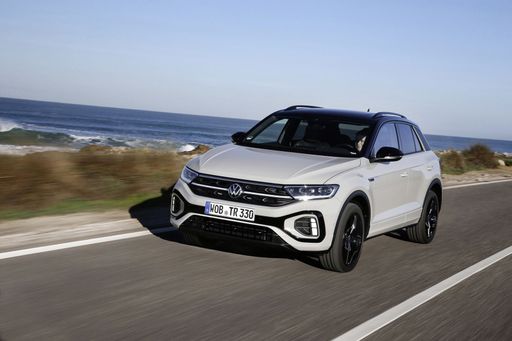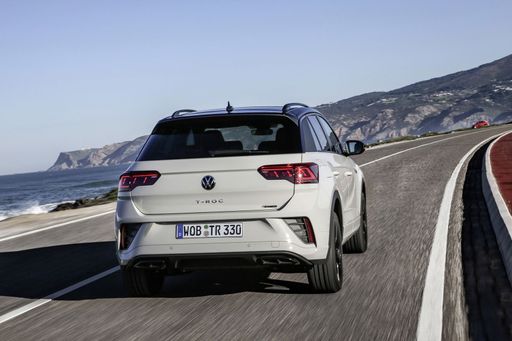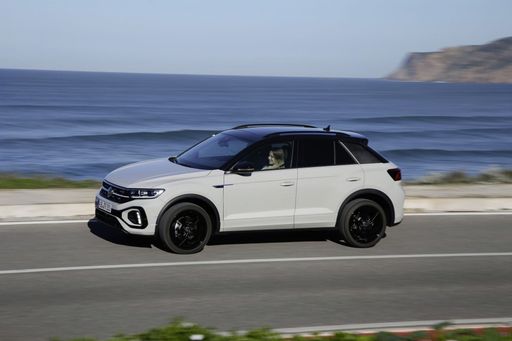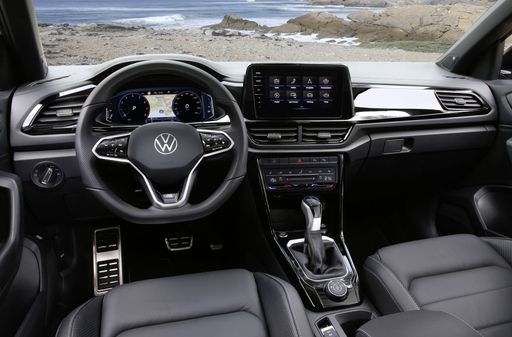Hyundai Kona VS VW T-Roc
In the competitive subcompact SUV market, the Hyundai Kona and VW T-Roc offer distinct appeal to drivers seeking style and versatility. The Kona impresses with its bold design, extensive tech features, and superior value, making it a strong contender for city dwellers. Meanwhile, the T-Roc stands out with its refined driving dynamics, upscale interior finishes, and a more engaging driving experience, catering to those who prioritize sophistication in their daily commute.
Hyundai Kona
The Hyundai Kona blends a bold design with a versatile interior, making it a standout choice in the compact SUV market. Its crisp handling and responsive steering provide an engaging driving experience, whether in the city or on the open road. The vehicle also offers a range of features designed to enhance comfort and connectivity, ensuring a pleasurable journey for both driver and passengers.
详细信息VW T-Roc
The VW T-Roc seamlessly blends stylish design with practical functionality, making it an ideal choice for those who enjoy both urban and countryside driving. Its modern interior features intuitive technology and comfortable seating, enhancing the overall driving experience. With its robust build and dynamic performance, the T-Roc is equipped to handle various road conditions with confidence.
详细信息As the compact SUV segment continues to grow in popularity, two strong contenders stand out: the Hyundai Kona and the Volkswagen T-Roc. Both models bring their own unique blend of style, technology, and performance to the table. In this article, we take a closer look at their technical specifications and innovations to see how they compare.
Engine Options and Performance
The Hyundai Kona offers a versatile lineup that includes petrol, full hybrid, and electric engines. With power outputs ranging from 100 to 218 HP, it caters to a wide range of driving preferences. The electric variant boasts an impressive range of up to 514 km on a single charge, along with a top speed of 201 km/h. Meanwhile, the T-Roc is more limited with petrol and diesel options, providing performance from 115 to a robust 300 HP, with a maximum speed reaching up to 250 km/h.
Acceleration is a noteworthy aspect for both vehicles. The Kona's fastest variant can reach highway speeds in just 7.8 seconds, while the T-Roc impressive performance cars can do this in as little as 4.9 seconds. This indicates that performance enthusiasts may gravitate more towards the T-Roc, while those seeking efficiency might prefer the Kona.
Fuel Efficiency and Environmental Considerations
When it comes to fuel efficiency, both models showcase attractive consumption rates. The Kona achieves between 4.5 to 6.7 L/100 km, depending on the engine type. The T-Roc, conversely, records slightly higher consumption rates, ranging from 4.7 to 8.5 L/100 km. The Kona's electric model performs exceptionally well with a consumption of 14.6 kWh/100 km, affirming its ecological credentials, especially in urban settings.
Interior Space and Comfort
Space is a key factor in the SUV category, and both the Kona and T-Roc are designed with practicality in mind. The Hyundai Kona offers a trunk capacity of 466 liters, significantly larger than the T-Roc's maximum of 445 liters. Both vehicles comfortably seat five, but the Kona’s spacious interior is particularly appealing for families and travelers alike.
Technological Features and Innovations
The Kona prides itself on its technological advancements with features like a fully digital cockpit, advanced connectivity options, and an intuitive infotainment system that seamlessly incorporates smartphone integration. Hyundai provides a suite of safety technologies, including adaptive cruise control and lane-keeping assist, enhancing driver confidence.
The T-Roc also excels in technology, with its state-of-the-art infotainment system and optional features like the digital cockpit, which can be tailored according to the driver’s preferences. VW has made strides in offering innovative driver assistance systems that can make driving safer and easier.
Conclusion: The Verdict
Choosing between the Hyundai Kona and Volkswagen T-Roc ultimately comes down to personal preference and priorities. The Kona exhibits outstanding efficiency, versatility, and a strong focus on eco-friendliness, making it a prime choice for the environmentally conscious driver. On the other hand, the T-Roc offers powerful performance and advanced technology that appeals to those who crave dynamic driving experiences.
Both vehicles stand strong in their respective corners, ensuring drivers will have plenty of compelling options to consider in the compact SUV market.
 @ hyundai.news
@ hyundai.news
 @ hyundai.news
@ hyundai.news
 @ hyundai.news
@ hyundai.news
 @ hyundai.news
@ hyundai.news
 @ Volkswagen
@ Volkswagen
 @ Volkswagen
@ Volkswagen
 @ Volkswagen
@ Volkswagen
 @ Volkswagen
@ Volkswagen

|

|
|
|
|
成本和油耗 |
|
|---|---|
|
价格
约 26400 - 48500
€
|
价格
约 27900 - 53100
€
|
|
油耗 L/100公里
4.5 - 6.7
L
|
油耗 L/100公里
4.7 - 8.5
L
|
|
能耗 kWh/100公里
14.6 - 16.8
kWh
|
能耗 kWh/100公里
-
|
|
电动续航里程
377 - 514
km
|
电动续航里程
-
|
|
电池容量
1.3 - 65.4
kWh
|
电池容量
-
|
|
二氧化碳
128, 103, 141, 152, 0
g/km
|
二氧化碳
125 - 194
g/km
|
|
油箱容量
38 - 47
L
|
油箱容量
50 - 55
L
|
尺寸和车身 |
|
|
车身类型
SUV
|
车身类型
SUV
|
|
座位数
5
|
座位数
4 - 5
|
|
车门
5
|
车门
2 - 5
|
|
整备质量
1370 - 1773
kg
|
整备质量
1304 - 1578
kg
|
|
行李厢容量
466
L
|
行李厢容量
284 - 445
L
|
|
长度
4350 - 4385
mm
|
长度
4236 - 4271
mm
|
|
宽度
1825
mm
|
宽度
1811 - 1819
mm
|
|
高度
1580 - 1585
mm
|
高度
1527 - 1584
mm
|
|
载荷
420 - 490
kg
|
载荷
368 - 509
kg
|
发动机和性能 |
|
|
发动机类型
汽油, 全混合动力, 电动
|
发动机类型
汽油, 柴油
|
|
变速器
Manuel, 自动
|
变速器
Manuel, 自动
|
|
变速器详情
手动变速器, Automat. Schaltgetriebe (Doppelkupplung), 减速齿轮箱
|
变速器详情
手动变速器, Automat. Schaltgetriebe (Doppelkupplung)
|
|
驱动类型
前轮驱动, 四轮驱动
|
驱动类型
前轮驱动, 四轮驱动
|
|
功率 (马力)
100 - 218
马力
|
功率 (马力)
115 - 300
马力
|
|
加速 0-100公里/小时
7.8 - 13.3
s
|
加速 0-100公里/小时
4.9 - 12.3
s
|
|
最高速度
162 - 208
km/h
|
最高速度
187 - 250
km/h
|
|
扭矩
200 - 265
Nm
|
扭矩
200 - 400
Nm
|
|
气缸数量
3 - 4
|
气缸数量
3 - 4
|
|
功率 (kW)
74 - 160
kW
|
功率 (kW)
85 - 221
kW
|
|
发动机排量
998 - 1598
cm3
|
发动机排量
999 - 1984
cm3
|
|
最高速度
162 - 208
km/h
|
最高速度
187 - 250
km/h
|
概况 |
|
|
车型年份
2024
|
车型年份
2024
|
|
CO2效率等级
D, C, E, A
|
CO2效率等级
D, E, F, G
|
|
品牌
Hyundai
|
品牌
VW
|
Hyundai Kona
The Hyundai Kona: A Comprehensive Overview
The Hyundai Kona has established itself as a standout in the compact SUV segment, blending innovation with performance and style. As the automotive world moves towards more sustainable and efficient options, the Kona offers a variety of powertrains, from traditional petrol engines to full hybrids and all-electric models.
Powertrain Options and Performance
The Hyundai Kona's powertrain choices cater to a wide range of preferences. For petrol enthusiasts, the Kona offers a 1.0L T-GDI engine, delivering 100 PS, and a more robust 1.6L T-GDI variant with up to 170 PS. Those looking for efficiency without sacrificing power can consider the full hybrid model, offering 129 PS and an impressive consumption of 4.5 L/100km.
For a greener option, the all-electric Kona provides a compelling case. With battery capacities of up to 65.4 kWh, the electric Kona offers power outputs of 156 to 218 PS, and efficiencies as low as 14.6 kWh/100km, enabling an electric range of up to 513 km.
Technical Specifications and Innovations
Built on a robust platform, the Kona delivers versatility and reliability. With a choice between manual or dual-clutch automatic gearboxes, along with options for front-wheel or all-wheel drive, the Kona ensures a tailored driving experience. The handling is enhanced by the car's lightweight construction, balancing a 1370 to 1773 kg curb weight with dynamic performance.
The Kona's design doesn't compromise cargo space for style; it offers a generous 466 L boot capacity. With a relatively compact body, measuring 4350 to 4385 mm in length, the Kona easily navigates urban environments while still commanding a strong road presence with its 1825 mm width.
Efficiency and Eco-Friendliness
Hyundai is committed to reducing emissions, as evidenced by the Kona's CO2 efficiency ratings, which range from class A for electric models to class D for some higher-performance petrol variants. The focus on reducing environmental impact without sacrificing driving pleasure is notable throughout the Kona range.
Costing and Value
The Hyundai Kona offers commendable value for money. Pricing starts at €26,400 and reaches up to €50,690, depending on the chosen configuration. The monthly running costs range from €956 to €1090, with a cost per kilometre of 38.3 to 43.6 cents, making it a competitive option in its class.
Conclusion: Modern, Efficient, and Versatile
The Hyundai Kona stands as a testament to Hyundai's commitment to innovation, efficiency, and practicality. Whether you are inclined towards a traditional combustion engine, a hybrid for a balance of power and efficiency, or a full electric model for maximum eco-friendliness, the Kona provides a tailored solution for each unique driver preference.
VW T-Roc
The VW T-Roc: A Blend of Style and Innovation
The Volkswagen T-Roc stands out in the competitive compact SUV segment, offering a dynamic combination of innovative technology and stylish design. The model has evolved since its inception, embracing new features and engineering advancements that appeal to a broad spectrum of drivers.
Engine Performance and Efficiency
The VW T-Roc provides an impressive range of engine options to meet various driving preferences. From the economical 1.0 TSI petrol engines to the robust 2.0 TDI diesels, there’s an engine to match every need. The power output spans from 115 PS to a thrilling 300 PS in the T-Roc R variant. Fuel efficiency is another highlight, with consumption figures ranging between 4.7 and 8.5 L/100 km, making it a practical choice for both city and long-distance driving.
Advanced Technology and Safety Features
Volkswagen has equipped the T-Roc with state-of-the-art technology to enhance both convenience and safety. The latest models include advanced driver assistance systems, such as adaptive cruise control and lane-keeping assist, which provide a safer driving experience. Additionally, the intuitive infotainment system supports a seamless connection to smartphones via Apple CarPlay and Android Auto.
Design and Customisation
The T-Roc’s design is bold and contemporary, reflecting its sporty nature. With a wide array of customisation options, including various trim levels like Life, Style, and the sporty R-Line, there are plenty of opportunities for personal expression. Both the interior and exterior can be tailored, with choices ranging from colour accents to different upholstery options, ensuring each T-Roc feels unique to its owner.
Spacious Interior and Practicality
Despite its compact exterior dimensions, the T-Roc offers a surprisingly spacious interior. It accommodates between four and five passengers comfortably, with ample legroom and headroom. The flexibility extends to the boot space, which ranges from 284 to 445 litres, depending on the configuration, providing practical storage capacity for everyday use or weekend getaways.
Conclusion: A Competitive SUV Choice
Overall, the VW T-Roc continues to be a strong contender in the compact SUV market, combining innovative features, efficient engines, and a distinctive design. It appeals to those looking for versatility and performance in a stylish package, making it an attractive option for both families and individual adventurers alike.
